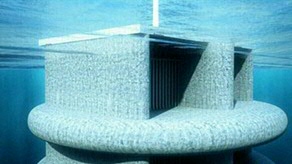More success stories

The Ocean Grazer project
Research on the Ocean Grazer, a novel renewable energy harvesting and storage technology, is led by the CMME ( Prof. Antonis I. Vakis and Drs Wout Prins ), the inventor of the original concept, and DTPA ( Prof. Bayu Jayawardhana ) groups. The technology aims to exploit the unused potential of offshore renewable energy by developing innovative solutions that improve the efficiency of offshore wind farms and increase the energy yield per square kilometer. This potential can be unlocked by combining various renewable energy sources such as wind, solar and wave energy at a given deployment location, within hybrid devices that also feature on-site energy storage. For more information please check The Ocean Grazer Project page .
BioBTX
Researchers in the group Green Chemical Reaction Engineering that Prof. Erik Heeres leads at the Engineering and Technology Institute (University of Groningen) have worked together with two companies, KNN and Syncom, for the development from biomass of three basic chemicals benzene, toluene and xylene (BTX) that are used in numerous chemical products such as epoxy resins, polycarbonate, aramid and other high-performance plastics. The project BioBTX, which holds relevance for both chemistry and the agro-industry, makes possible the production of green materials with high added-value from organic waste, and the reduction of CO2 emissions associated with the production of BTX.
Sustainable buildings
The Sustainable Buildings initiative, a spin-off of the Distributed Systems research group (under the leadership of Prof. Marco Aiello) at the University of Groningen has as main goal to make office buildings more energy efficient and therefore sustainable. Sustainable Buildings offer customized solutions for consumption and environment monitoring, and for manual and automatic control. To do that, they provide a SaaS cloud platform that enables organizations and businesses to save up to one-third of energy in their buildings. The spinoff also focuses on public energy dashboards that make users of buildings more aware of energy they consume at work, on energy dashboards for management that help managers get better insights into energy consumption in their buildings and on automating the control of energy consuming devices using intelligent algorithms.
Cellulose Assisted Dewatering of Sludge
The research group Products and Processes for Biotechnology in the Biobased Economy, under the leadership of Prof. Gert-Jan Euverink (Engineering and Technology Institute Groningen), works together with water authorities and industry (Attero, Brightwork, the Centre of Expertise for Water Technology, Waterschap Noorderzilvest, Wetterskip Fryslân’) in the project CADoS for the cellulose assisted dewatering of sludge. Wastewater carried via sewers to the treatment plant contains solid matter that includes a large proportion of cellulose. The cellulose stems from the use of toilet paper. The project will separate the solid matter containing cellulose that is present in the sewage water by means of a fine sieve and will use the separated solid matter for the dewatering of sewage sludge. CADoS principle is being applied to attempt to significantly reduce the use of chemicals at the treatment plant, to consume less energy and to lower sludge processing costs. CADoS will also increase the energy yield from biogas in the fermentation of sludge.
SPRINT
SPRINT is a joint initiative of the University of Groningen, the University of Groningen, the University Medical Center Groningen, the University of Twente, and the Hanze University of Applied Sciences, which develops innovative technologies to improve or restore the mobility of the elderly. Research at SPRINT focuses on the development of Smart Mobility Devices to prolong the mobility of the elderly and facilitate rehabilitation treatments, and on developing innovative prostheses and orthoses. Several engineering scientists at the UMCG and the University of Groningen participate in the leadership of SPRINT: Prof. Bart Verkerke, Ing. Herman Kuis and Prof. Hans Wortmann.
| Last modified: | 15 February 2023 1.30 p.m. |
